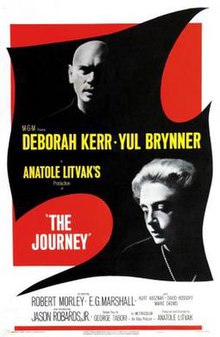The Journey (1959 film)
| The Journey | |
|---|---|
 Theatrical release poster | |
| Directed by | Anatole Litvak |
| Written by | George Tabori |
| Produced by | Anatole Litvak |
| Starring | Deborah Kerr Yul Brynner Jason Robards |
| Cinematography | Jack Hildyard |
| Edited by | Dorothy Spencer |
| Music by | Georges Auric |
Production company | Alby Pictures |
| Distributed by | Metro-Goldwyn-Mayer |
Release date | February 19, 1959 |
Running time | 122-126 minutes |
| Country | United States |
| Language | English |
| Budget | $2,290,000[1] |
| Box office | $3,450,000[1][2] |
The Journey is a 1959 American drama film directed by Anatole Litvak. A group of Westerners tries to flee Hungary after the Soviet Union moves to crush the Hungarian Revolution of 1956. It stars Deborah Kerr, Yul Brynner, Jason Robards and Robert Morley. Deborah Kerr and Yul Brynner were paired again since they starred in The King and I in 1956, where he had an Oscar-winning performance. The Journey was shot in Metrocolor.
Plot
This section needs expansion. You can help by adding to it. (September 2010) |
Major Surov (Yul Brynner) is the Russian commander at the Hungarian-Austrian border crossing. With the outbreak of the Hungarian Revolution of 1956, Budapest's airport is shut down and Diana (Deborah Kerr), along with other international travellers from U.S., Britain, Germany, Israel, and France, is forced to reach Vienna by bus. Along with them is a Hungarian dissident hunted by the police, Paul (Jason Robards).[3]
Cast
- Deborah Kerr as Diana Ashmore
- Yul Brynner as Major Surov
- Jason Robards as Henry Flemyng / Paul Kedes (as Jason Robards Jr.)
- Robert Morley as Hugh Deverill
- E. G. Marshall as Harold Rhinelander
- Anne Jackson as Margie Rhinelander
- Ron Howard as Billy Rhinelander (as Ronny Howard)
- Flip Mark as Flip Rhinelander
- Kurt Kasznar as Csepege
- David Kossoff as Simon Avron
- Gérard Oury as Teklel Hafouli
- Marie Daëms as Françoise Hafouli (as Marie Daems)
- Anouk Aimée as Eva
- Maria Urban as Gisela von Rachlitz
- Siegfried Schürenberg as Von Rachlitz
- Charles Regnier as Capt. Ornikidze
- Iván Petrovich as Szabó Bácsi
- Senta Berger as Serving Girl in Black Scarf
Notes
The following prologue appears in the onscreen credits: "The action of this story takes place between Budapest, the capital of Hungary, and the Austro-Hungarian border, where the film was actually photographed. The time is November, 1956, during the tragic days of the Hungarian uprising."
This film was Jason Robards' screen debut.
Ron Howard had appeared in an unbilled part in the 1956 film Frontier Woman, but The Journey marked his first credited appearance; he was billed as Ronny Howard.
Box office
According to MGM records the film earned $1,300,000 in the US and Canada and $2,150,000 elsewhere resulting in a loss of $905,000.[1]
See also
References
External links
- The Journey at IMDb
- The Journey at the TCM Movie Database
- The Journey at AllMovie
- The Journey at the AFI Catalog of Feature Films
